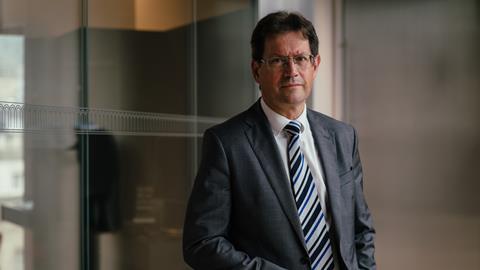As Nick Ephgrave publishes his first annual business plan after a full year in the role, the SFO chief tells the Gazette that he wants to deploy his policing expertise to make investigations bolder, speedier and more aggressive
Serious Fraud Office chief Nick Ephgrave, who recently completed 18 months as head of the agency, has published his first annual business plan, covering 2025/26, after a full year in the role.
Speaking to the Gazette, he admitted there are no headline-grabbing pronouncements. But he has been generally satisfied with progress since he joined. Perhaps this is reflected in the absence of the kind of negative headlines that have plagued the organisation in the recent past. Five cases are listed for trial in 2026.
‘Last year, we set out a fairly ambitious series of objectives primarily based on increasing the pace of our investigations,’ he said. ‘That means going from investigation to charge more quickly [and] being bolder about getting rid of investigations that just aren’t going anywhere. Every minute we spend investigating something that is not going anywhere is not a good use of taxpayer money.
‘I am really keen on leveraging some of my expertise in policing into this world,’ added the former Met assistant commissioner. ‘It’s all about investigation. Why don’t we use more covert techniques? Why aren’t we hungrier and more aggressive in our pursuit of individuals? Why are we potentially too reactive? There’s lots we have done in our intelligence division and operations teams to improve that.’
The SFO already has a proceeds of crime division, but this has now been supplemented by an asset confiscation enforcement team (ACE). ACE will focus on asset recovery matters that the proceeds of crime division is too busy to handle.
Most of what ACE will be working on is ‘historical stock – a bulk of court orders and requirements for people to pay that is sitting there that hasn’t been actioned’. Some £9m of assets have been identified for the team to ‘go after’.
The SFO now has a crypto expertise team too, so the agency is ‘better placed to be able to pursue ill-gotten gains, but also to understand how to pursue those that use cryptocurrency to hide profits’.
Since Ephgrave arrived, the agency has ‘overtly’ opened eight investigations – ‘a lot for the SFO’.
Axiom Ince is one of these. Five former executives will be tried in 2027 on charges including fraud and forgery. Four did not enter a plea at Southwark Crown Court in February. One of the five pleaded not guilty.
'There had been a tendency to over-complicate in some of our casework. Coming from where I do, you have to be practical and go for what’s achievable in a reasonable timeframe. I think we achieved that with Axiom Ince'
Nick Ephgrave, director, Serious Fraud Office
‘In 15 months we have charged individuals – that’s three times as quick as the next quickest.
‘Axiom Ince was by coincidence a good one to work with,’ he added. ‘We had a degree of material already collated by other regulatory bodies [including the Solicitors Regulation Authority], so we didn’t have to start from scratch.’
He also noted the need to marshal the organisation’s limited resources. The SFO was handed an extra £9.3m in the latest spending review which covered various projects including the creation of ACE, but it continues to operate within a tight budget.
Investigations need a ‘balance between making sure you deal with the criminality and those who are most culpable, without seeking to boil the ocean’, he said. ‘I think there had previously been a tendency to over-complicate in some of our casework. Coming from where I do, you have to be practical and go for what’s achievable in a reasonable timeframe. I think we achieved that with Axiom Ince.’
It is no secret that one of the biggest impediments to achieving speedier results is disclosure. Jonathan Fisher KC’s recent review Disclosure in the Digital Age made clear that this growing challenge threatens to choke prosecutions.
Ephgrave is on the case: ‘Disclosure is a huge burden. We recognised there was a machine-learning facility on our “accelerate” system that we had not exploited, so a year ago we said: “let’s exploit it”. We ran a pilot on a live case under live fire with the judge and the defence teams. We used the augmented intelligence function of this system to go through the disclosure process and it did the job 40% quicker than a human being can do it, with no loss of accuracy.’
The plan is to roll out technology-assisted review to more cases and increase that 40% improvement rate.
Other technological advancements include a case management system that is actually fit for purpose. ‘The system that we have procured this year [from Clue] is all going to be about landing it – getting it in and running it – and that is going to be a major enterprise,’ he added. ‘I have done these things before, they are never easy. They are fraught with danger.’
The SFO is also preparing to launch revised guidance for corporate entities on raising concerns about potential fraud or corruption – ‘the vanguard of our preventative work’.
‘This is really exciting,’ Ephgrave said. ‘For the first time, the guidance sets out what the agency’s “offer” actually is.
‘It is saying, “here is the situation you face [as]corporates, here is what we can offer, here are our guarantees to you, here are some indications of what timeframes look like, and here’s who to speak to”. We have not had that before.’
This article is now closed for comment.





































2 Readers' comments